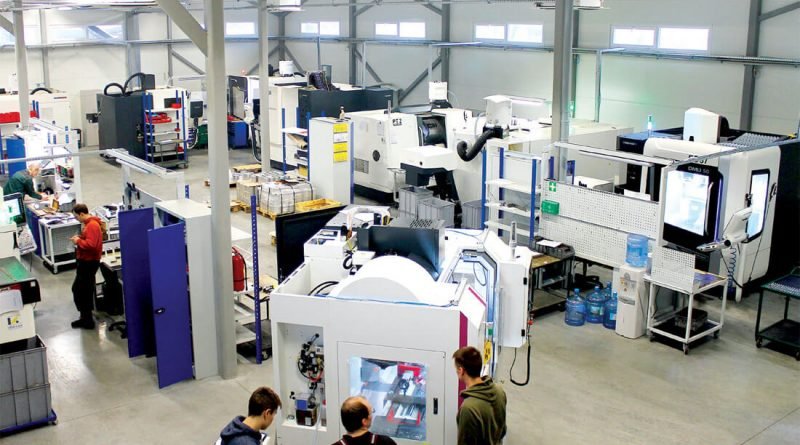It’s Industry 4.0! Metalwork is no longer a dirty occupation
Lina SVALDENIENĖ
Industry 4.0 Challenge: Empowering Metalworkers for Smart Factories of the Future is a three-year-long international project, co-funded by Erasmus+ Programme. Started at the end of 2016, now project is in the last stage, piloting.
PILOTING
“Five different companies from Estonia, Latvia, Lithuania and Germany started to use the products we created during the project. First results are positive and we hope that the work which has been done by all partners is going to be successfully used in practice“, – said project manager Gintaras Rimša in Kaunas, at the 4th international conference, dedicated to Industry 4.0.
During the previous stages of the project three Baltic countries along with Germany put their efforts together to tackle skills gap of metalworkers. The main facts and problems were detected: what standards of CNC (computer numerical control) operators’ qualification exist in different countries and what is missing in that qualification. Afterwards, system named Galaxy Model was created. It includes 5 sets of competencies: basic and advanced technical skills, digital skills, competences of a smart factory, change and innovation management, self learning and coaching. Each skill in a particular set can be leveled from 3 to 5, according its importance in the workplace.
Armed with a Galaxy model, twelve participating partners – industry associations, VET providers, governmental bodies of certification as well as private enterprises – designed a new, targeted VET (vocational education and training) programme. All the methods and tools in this programme are based on the current skills demand. Furthermore, they are determined to cover future skills, which are going to be demanded in a smart factory of the metalworking sector.

TECH-DRIVEN INDUSTRY
What makes an industrial worker qualified today is much different what it used to be a decade ago. There is less manual work, more engineering in a smart factory. The need for advanced technology and digital skills increases every year. Metalworkers should be qualified with wide array of skills, including metal tooling knowledge, mechanical and mechatronic skills along with programming, robotics, computer-aided design and manufacturing (CAD/CAM), networking IT security and big data. Moreover, worker of smart factory is expected to be confident in change and innovation management, be able to self-learn and coach others.
“When the global market requires to increase efficiency, new challenges rise in front of each metalworking company. In engineering industry, the problem is that professional skills in need are constantly changing. Giant concerns, such as Siemens or Continental, have a huge potential to invest to special tools for the training of human resources to increase efficiency. But other companies, mainly SME (small and medium-sized enterprises), are not able to put so many finances and devote so much time to educate their employees”, – notices G.Rimša, project manager and chairman of management board in UAB Baltec CNC Technologies.
The learning system, developed in the project, should let enterprises of metalworking sector have qualified workers and gain competitive position within the EU.

EDUCATIONAL PRODUCTS
Products, developed during project Industry 4.0 Challenge: Empowering Metalworkers for Smart Factories of the Future can be used in VET as well as directly on the job training in metalworking enterprises. Next to the VET programme, self-adaptive workbased learning system was developed.
G. Rimša points out, that CNC operating is a process of machine controlling: both programming and setting tool parameters can be considered digital skills. So CNC operators have already been digital natives a long time ago. Seemingly it should be easy to increase their additional capacities, but practice shows that even fundamentally prepared employees have some knowledge gaps. While smart factory equipment becomes more and more complicated and CNC machines are loaded with new solutions, not each employee is able to fully use its capacity, which, of course, negatively affects productivity and overall value chain.
“We must have found solution how to teach them efficiently and in shortest time possible, as CNC operators are in high demand in EU – not only EU – everywhere in the world (if one made investigation in US or China, it would be clear that skilled metalworkers are in huge demand). Not only ready-to-work metalworkers are absent – any good teachers, who follows the development of the machines, do not exist too.” – says project manager.
That’s why the project aimed to create new learning possibilities not only to future CNC operators, but their teachers as well.

When the global market requires to increase efficiency, new challenges rise in front of each metalworking company. In engineering industry, the problem is that professional skills in need are constantly changing.
Gintaras Rimša
NEW COLLAR
An urge to empower metalworkers to meet that demand in the worldwide job market exists for multiple reasons. Despite the fact that VET institutions lacks constantly improving teachers and can not prepare an ideal match for a smart factory worker position, there is also a matter of old-fashioned attitude.
It used to be white and blue collars in the factories. White ones were with university degrees, mechanical engineers; blues were hard workers with jumpsuits soaked in oil. There was straightforward hierarchy where those, whose brain is working, tell what to do to those, who work with hands. This image, probably the remain from the industry 2.0, makes industrial sector seem like an unattractive and dirty place to work, by real and symbolic means.
For this reason, participants of the project seek to introduce a New Collar. That should be somebody in between white and blue, somebody with a college degree in smart production. This new collar, generation of new employees, must increase attractiveness of jobs, connected with CAD/CAM implementation and involving new solutions of Industry 4.0, and finally increase competitiveness of all metal sector of countries, participating in this project.




